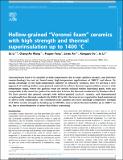Hollow-grained “Voronoi foam” ceramics with high strength and thermal superinsulation up to 1400 °C
Author(s)
Li, Sa; Wang, Chang-An; Yang, Fuqian; An, Linan; So, Kangpyo; Li, Ju; ... Show more Show less
DownloadAccepted version (1.771Mb)
Publisher with Creative Commons License
Publisher with Creative Commons License
Creative Commons Attribution
Terms of use
Metadata
Show full item recordAbstract
© 2021 Elsevier Ltd Nanostructures tend to be unstable at high temperatures due to large capillary energies, and therefore nanotechnology has not yet found many high-temperature applications at 1000 °C and above. By taking advantage of the high-temperature stability of refractory ceramics, here we develop a new approach of making hollow nano-grained materials to achieve thermal superinsulation across a wide temperature range, where the gaseous voids are mostly isolated within individual grain, with size comparable to the mean free path of air molecules to lower the thermal conduction by Knudsen effect. We have proved this general concept with hollow-grained La2Zr2O7 ceramic, and demonstrated exceptionally low thermal conductivity (0.016 W/(m⋅K)), the lowest ever reported for hard materials at or above room temperature. The centimeter-scale samples also have ultrahigh compressive strength (251 MPa), tensile strength in bending up to 100 MPa, and excellent thermal stability up to 1400 °C in air, due to monodispersity of pores that delays coarsening.
Date issued
2021Department
Massachusetts Institute of Technology. Department of Nuclear Science and Engineering; Massachusetts Institute of Technology. Department of Materials Science and EngineeringJournal
Materials Today
Publisher
Elsevier BV